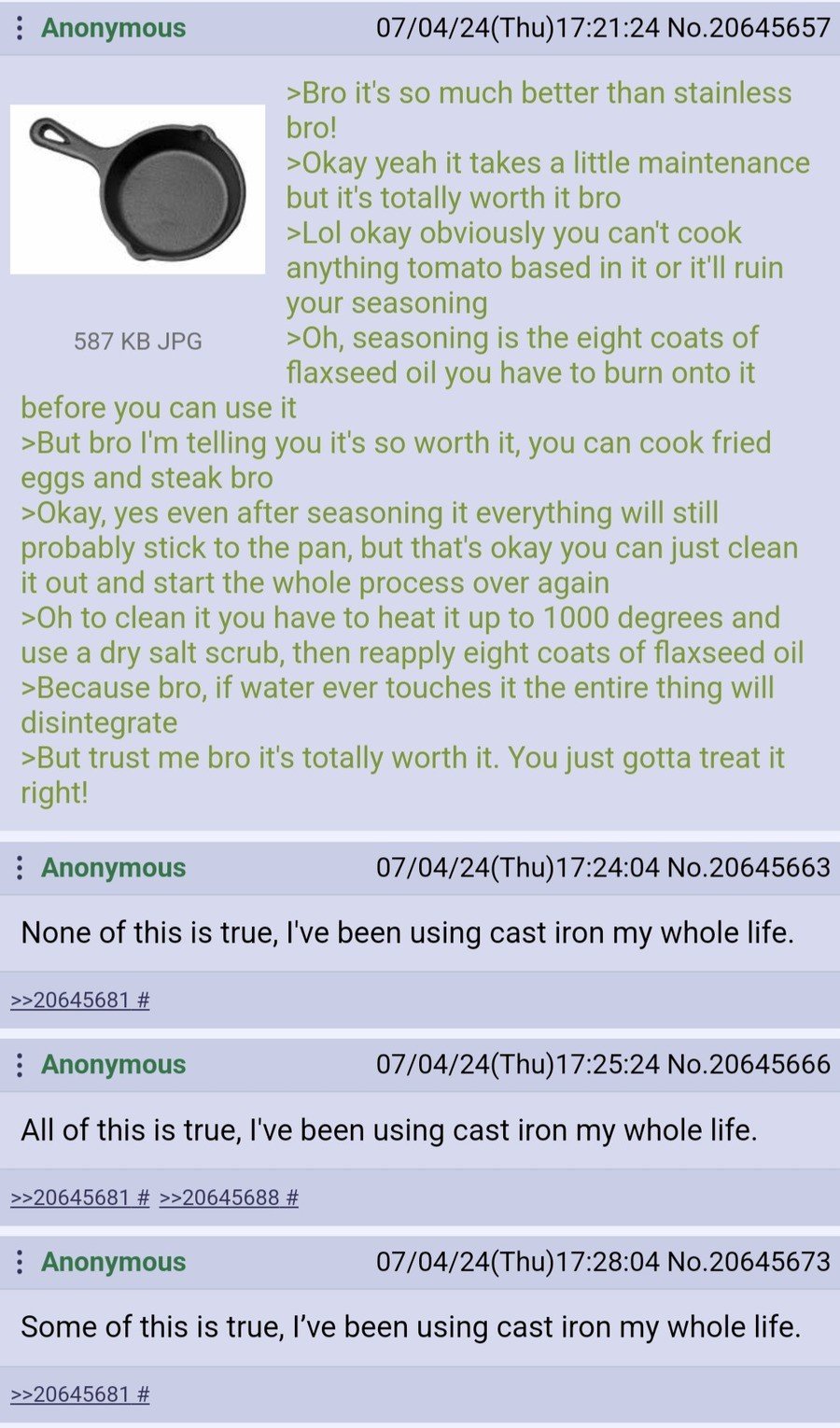this post was submitted on 02 Oct 2024
1066 points (99.4% liked)
Greentext
4385 readers
1255 users here now
This is a place to share greentexts and witness the confounding life of Anon. If you're new to the Greentext community, think of it as a sort of zoo with Anon as the main attraction.
Be warned:
- Anon is often crazy.
- Anon is often depressed.
- Anon frequently shares thoughts that are immature, offensive, or incomprehensible.
If you find yourself getting angry (or god forbid, agreeing) with something Anon has said, you might be doing it wrong.
founded 1 year ago
MODERATORS
you are viewing a single comment's thread
view the rest of the comments
view the rest of the comments

I have a cast iron pan. Pros - it'll last forever if you look after it, it doesn't contain PFAS and generally it is non-stick enough to not be a nuisance. Cons - heavy AF, needs to be cleaned and dried after use & not in a dishwasher. I haven't tried to cook anything acidic in it yet but it does okay for steaks, eggs, mushrooms, sauces that I have used it for.
I still use soap and a plastic scrubber on mine and just dry it on the hob for a bit. I haven't had to reseason it yet but I imagine it will be a pain in the ass when I do. I have seen part of the seasoning flake off but it normally self heals with more cooking.
So it's okay overall but I think lack of PFAS and the fact that this thing will last a lifetime are the clinchers. Even if you have non-stick buy one of these and use it by default. I expect a stainless steel pan would be good too for same reasons.
I've heard from several sources that the iron is supposed to be good for the diet. I love my carbon steel and cast iron kitchenware. All of the studies I've seen show it as a superior option to PFAS cookware and will still outlast the latest ceramic options. I have a very non-stick carbon steel pan and griddle from avocado oil seasoning.
You didn't mention that you're oiling it after drying it. It's recommended that you lightly oil the surface upon storage.
One Source: https://www.youtube.com/watch?v=Px6jqcYFdFs
I think cast iron will definitely outlast ANY non-stick, no question. For non-stickiness though it's basically on the tolerable end - put oil in it and most stuff will slide around but sometimes you don't want too much oil so its a trade off. I think stainless steel is a great option in its own right - it's not really non stick but it can be made tolerable with oil and can be scrubbed back to condition and thrown in the dishwasher.
I sometimes coat my cast iron pan in oil, but more often than not I don't.
Not sure if you are saying the non-stick surface of a seasoned (carbon steel or) cast iron pan is inferior to PFAS options, that's how I'm responding below.
Speaking from experience, I've screwed up seasoning pans before I got it what I'd call right.
A poorly seasoned polymerized surface on any metal (cast iron, carbon steel, stainless steel, or titanium) will always fair poorly, though more healthy than teflon style pans.
A properly seasoned polymerized surface on any smooth metal is easily on par or superior (regarding stickiness) with non-stick PFAS or metalized ceramic.
It absolutely requires minimal oiling when properly seasoned. I absolutely use less oil in my carbon steel pans than I would with 'non-stick' pans.
Another issue I see frequently is putting food into a pan that is too cold.
Stainless steel can be non-stick using either the Leidenfrost effect or seasoning/oil polymerization. I do like being able to put my dishes through the auto-wash. My carbon steel and cast iron surfaces being the exception.
I'm telling you what my experience is. I have pans that have a self healing non-stick surface. I don't put soap on my cast iron or carbon steel unless planning to re-season. I boil water and may agitate it with salt if something sugary stays stuck to the surface. The flame/heat sterilizes, and the water+salt granules removes particulate.
I can fry an egg with less than a light spray of oil and produce a picture perfect egg consistently.
I'm in process of removing all of our PFAS or newer titanium ceramic gear due to it failing from scraping or flaking.
I am not eating out of your kitchen, not trying to tell you how to manage the tools. Offering suggestions, I feel could make life easier for you.
If it works for you, and you're happy - carry on.